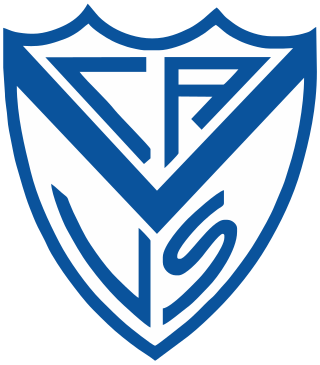
Club Estudiantes de La Plata, simply referred to as Estudiantes de La Plata, is an Argentine professional sports club based in La Plata. The club's football team currently competes in the Primera División, where it has spent most of its history.

Club Atlético Vélez Sarsfield is an Argentine sports club based in Liniers, Buenos Aires. Its football team plays in Primera División, the highest level of the Argentine league system. Founded in 1910, the club has spent most of its history in the top tier of Argentine football. The club's home ground is the 49,540-capacity José Amalfitani Stadium, where they have played since 1951.

Pedro Antonio Troglio is an Argentine football manager and former player who played as a midfielder. He is the current manager of Honduran club CD Olimpia

Alejandro Javier Sabella was an Argentine football player and manager. Born in Buenos Aires, he began his playing career with River Plate in his home country before moving to England in 1978 to play for Sheffield United. He then had a spell with another English side, Leeds United, before returning to South America and representing Estudiantes, Grêmio, Ferro Carril Oeste and Irapuato.
Torneos de Verano are a series of short friendly football pre-season tournaments held during the southern summer in Argentina every year, usually in January and February. They serve as preparation for the teams for the season coming; however, as the years went by the competitiveness in the tournaments increased, and they are now considered as important competitions. This is clearly reflected in the high crowd attendance for the games.

Club Atlético All Boys is an Argentine sports club based in Floresta, Buenos Aires. The institution is mostly known by its football team, which currently plays in the Primera B Nacional, the second division of the Argentine football league system.

Superclásico is the football match in Argentina between Buenos Aires rivals Boca Juniors and River Plate. It derives from the Spanish usage of "clásico" to mean derby, with the prefix "super" used as the two clubs are the most popular and successful clubs in Argentine football. In fact, the term 'Clásico' originated in Argentina, particularly with this match up and it was later exported to other countries such as Spain and Mexico. According to some statistics, they command more than 70% of all Argentine football fans between them.
The Cabo Verdean diaspora refers to both historical and present emigration from Cape Verde. Today, more Cabo Verdeans live abroad than in Cape Verde itself. The country with the largest number of Cape Verdeans living abroad is the United States.

José María Minella (1909–1981) was an Argentine football player and manager. He played for and managed Argentina's national team.
This is a list of major records of the Argentine Primera División, the top level of the Argentine football league system. The first season was held in 1891.

The Copa Libertadores is the most important international football club competition in South America. Throughout the history of the tournament, 25 teams from seven countries have won the competition. Its rich history has been saturated with many legendary matches, iconic players and exceptional teams; from Peñarol's historical consecration in 1960, to Coutinho and Pelé enchanting the world with Santos's magical football, down to Estudiantes's unlikely success at the end of the 1960s, and Club Atlético Independiente being brought to glory in the utmost manner.

The Copa Ricardo Aldao, popularly called Campeonato Rioplatense and Copa Río de La Plata, was an official AFA-AUF football club competition contested annually, albeit irregularly, between the league champions of Argentina and Uruguay. The trophy was donated by Argentine football executive Ricardo Aldao (1863–1956), who would later become president of the Argentine Football Association.

José Varacka was an Argentine football player and coach.

Juan Carlos Touriño Cancela was a professional footballer who played as a defender. After starting his career in Argentina, he won two La Liga titles and two Spanish Cups with Real Madrid, and made one appearance for the Spain national team.

Carlos Roberto Aldabe was an Argentine association football player and coach. He is mostly known for leading the then prominently staffed Colombian club CD Los Millonarios as player-manager to their first championship.

Germán Alejo Pezzella is an Argentine professional footballer who plays as a centre-back for La Liga club Real Betis and the Argentina national team, with whom he won the 2022 FIFA World Cup.
These are the squads for the countries that played in the 1916 South American Championship. The participating countries were Argentina, Brazil, Chile and Uruguay. The teams plays in a single round-robin tournament, earning two points for a win, one point for a draw, and zero points for a loss.

Manuel Giúdice was an Argentine football player and manager. He is mainly known for his successful managing spell at the helm of the Argentine powerhouse Club Atlético Independiente in the mid-1960s.

Ignacio Martín Fernández is an Argentine footballer who plays as a midfielder for River Plate.

Rubén Omar Sánchez Compostella is an Argentine retired footballer. Nicknamed "Loco", he played as a goalkeeper for Boca Juniors where he would be part of the winning squad of three editions in the Argentine Primera División. He also played on an international level for Argentina between 1968 and 1973.
















